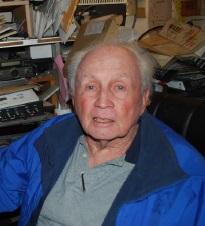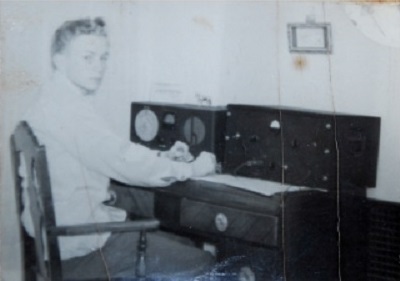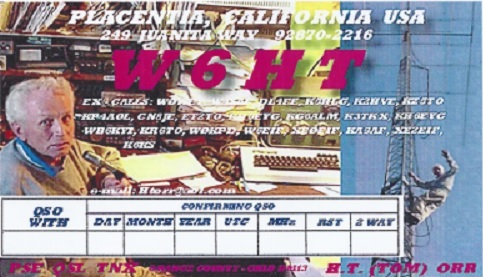 |
W6HT Howard T. Orr Jr Placentia, CA QCWA # 10096 |
A native of South Dakota, Tom has traveled around the world twice, DX.ing from many of the countries he was sent to as an engineer for ITT, Hughes Aircraft and Rockwell International. With a knack for picking up languages, Tom speaks Spanish, French, German, Arabic, Japanese, Mandarin Chinese and is currently learning Korean.
 My introduction to radio was via Morse code. I lived in Silver Spring, Maryland at the time. I was eight years old. I sent a Ralston Cereal box top and ten cents into the company for a Tom Mix telegraph set. The boy in the next apartment did the same. We strung wires between our apartments and sent to each other. This was shortly before the United States entered World War II. I started short wave listening and discovered some commercial telegraph stations on my parents all band receiver. I got good enough at the code to copy commercial telegraph stations such as WSL and WAX. They repeated a machine sent QRA (CQ) and I managed to get a little more each transmission. Soon I was copying the entire transmission.
My introduction to radio was via Morse code. I lived in Silver Spring, Maryland at the time. I was eight years old. I sent a Ralston Cereal box top and ten cents into the company for a Tom Mix telegraph set. The boy in the next apartment did the same. We strung wires between our apartments and sent to each other. This was shortly before the United States entered World War II. I started short wave listening and discovered some commercial telegraph stations on my parents all band receiver. I got good enough at the code to copy commercial telegraph stations such as WSL and WAX. They repeated a machine sent QRA (CQ) and I managed to get a little more each transmission. Soon I was copying the entire transmission.
During the early part of World War II, I discovered the Radio Germany voice broadcast. I lived in Parkersburg, West Virginia at this time. I can remember hearing their sign on. It went something like this: "Hier spricht Deutchland Sender broad-kastieren nach Nord America, Central America, und Sud America. Jetzt un-ser Broadkast auf Englisch." Then you would hear an accented voice saying in English "Good evening ladies and gentlemen." I remember just after the U.S. invaded North Africa. It went something like "American mothers bring your sons home from North Africa. They are fighting for the British, the same people you fought against in your revolution." Quite often you could hear the jamming signals coming from Britain as well. "The guns are blowing up in their faces." "American mothers bring you sons home from North Africa."
After the war, I worked in both Germany and Japan. The German and Japanese hams could not believe that during the war I was permitted to listen to enemy broadcasts.
I did not actually get my ham ticked until 1949. There was no Novice Class license then you needed to pass what is now called the Conditional Class license or the General Class license which included a 13 w.p.m. test. I had no trouble with the code but the theory was the big problem for me. I finally memorized the license manual and passed it, I am sure just barely.
I had joined the South Dakota National Guard while in high school and we were activated after the Korean War broke out in 1950. I spent almost a year in Ft. Bragg, North Carolina, then we were sent to Germany. In North Carolina I was W4SAL, in Germany I became DL4FF. I have had a total of 22 different calls.
Tom is at the top of the DXCC Honor Roll and doesn't spend a lot of time on the air these days, although he does keep in touch with his old friends via Echolink. Tom and his wonderful XYL, Muggs, have lived in the same house in Placentia since 1965.

November 6, 2014